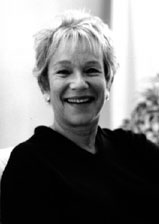
introducing readers to writers since 1995
February 11, 2005
Guest Author: Edith Pearlman
by Ron Hogan Edith Pearlman's most recent collection of short stories is How to Fall, out this month from Sarabande Books. The stories, which Joanna Scott says "combine subtlety with extravagance, understatement with spectacle," is the 2003 winner of the Mary McCarthy Prize in Short Fiction, thus extending Pearlman's streak of prize-winning collections to all three of her books, starting with her debut, Vaquita, which received the Drue Heinz Prize for Literature, after which Love Among the Greats was awarded the Spokane Annual Fiction Prize. As it happens, many of the stories in How to Fall share a setting in Godolphin, a "leafy wedge of Boston" which may, perhaps, share a few characteristics here and there with Brookline, where she has lived much of her adult life. I asked her if she'd tell Beatrice readers a bit about how she discovered this locale and what it has come to mean for her and her stories.
Edith Pearlman's most recent collection of short stories is How to Fall, out this month from Sarabande Books. The stories, which Joanna Scott says "combine subtlety with extravagance, understatement with spectacle," is the 2003 winner of the Mary McCarthy Prize in Short Fiction, thus extending Pearlman's streak of prize-winning collections to all three of her books, starting with her debut, Vaquita, which received the Drue Heinz Prize for Literature, after which Love Among the Greats was awarded the Spokane Annual Fiction Prize. As it happens, many of the stories in How to Fall share a setting in Godolphin, a "leafy wedge of Boston" which may, perhaps, share a few characteristics here and there with Brookline, where she has lived much of her adult life. I asked her if she'd tell Beatrice readers a bit about how she discovered this locale and what it has come to mean for her and her stories.
O My Godolphin
by Edith Pearlman
The town of Godolphin, though geographically a wedge of Boston, is self-governing by a representative Town Meeting whose members scream at each other for several evenings every October. Bow-fronted apartment buildings line Jefferson Boulevard; trolley tracks run down its middle like a zipper. In the town live ancient Yankees, prosperous Jews, envious academics; shopkeepers, secretaries, music teachers; Asian-Americans, Irish Americans, Russian almost-Americans. A few inhabitants sleep in alleys. Godolphinites exhibit every sexual preference including the preference to be left alone.
Godolphin is my domain. I invented it, I run it, I worry about it, and I write about it. Stories with a Godolphin setting have appeared in national magazines, literary quarterlies, Jewish periodicals, and Sunday supplements, and more than half of the stories in How To Fall take place there.Once an imaginary place has been established in a few tales, it reveals further attributes to the author. She can use them or ignore them or save them for later: those parks and hills and views and shops and institutions; that atmosphere of good-heartedness and hypocrisy and silliness and rue. New people pop up: an End-of-the-World man, a medium, a monologuist, two mute lovers. The place invites these characters; the characters influence the place.
A writer who uses the same setting and a familiar troupe of supporting characters can be said to be constructing a continuing saga, a human comedy. More modestly--more truthfully--she is simplifying her milieu, making it flexibly ready for any tale she wants to set there. If readers recognize the town, and look forward to visiting it again, so much the better. Now the writer has that delightful thing, a following.
And the place itself becomes a collective character--with eyes and ears, and with recognizable values, not every one of them admirable. When Donna Crowninshield opened her soup kitchen there was a terrific fuss:
"Do we want this element sleeping under our trees and terrifying our children? gentlefolk demanded. Donna and her staff of volunteers went on dishing out meals, and after a while the outcry died down, especially when it was noticed that most guests of the soup kitchen took the trolley back to the city after lunch, apparently preferring Boston's benches to Godolphin's."Godolphin is not microcosmic or generic. It is particular and peculiar. I cannot bring tanks onto Jefferson Boulevard, or make the public golf course the site of a county fair where a man gets drunk enough to sell his wife. But crime can find its way to the town's leafy streets, as can a measure of magic, and lust and death and accident and sin. For glitz, high culture, and drugged misery, I can send my characters to the city nearby.
It is a pleasure, this work--the work of trying to render a detailed, physical, immediate town which develops further in every new story. Each small neighborhood within Godolphin is home to somebody or other; each street-corner is someone's hangout. Hanging out with my characters, I am unlikely to slip into abstractions or indulge in highbrow theories. But if I do get smug or careless, the citizens of Godolphin will no doubt run me out of town and hire themselves a new chronicler.
your PayPal donation
can contribute towards its ongoing publication.